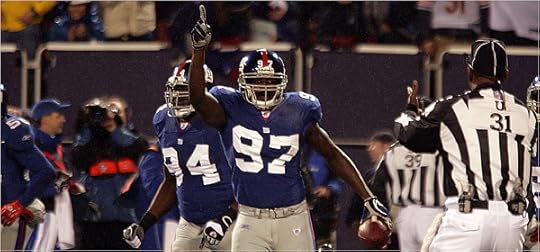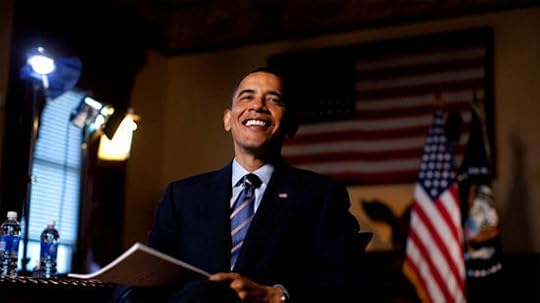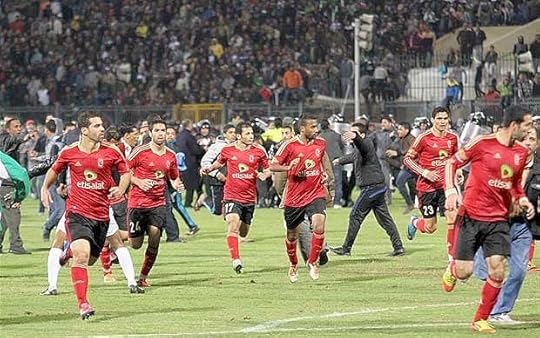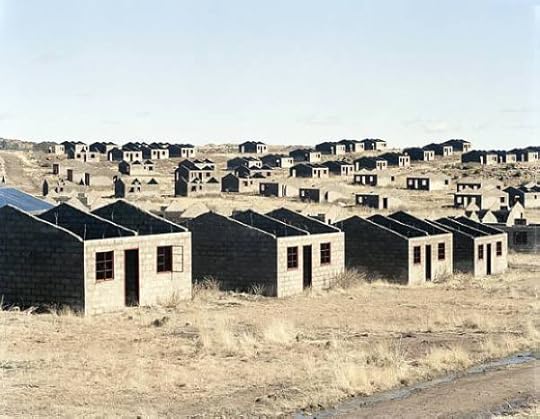Sean Jacobs's Blog, page 567
February 5, 2012
The African and the Superbowl

Written by Elliot Ross*
I am trying to avoid the media blitz on the Superbowl–I don't particularly care for American football and will be spending this Sunday afternoon at a fondue party and the rest of the week trying to avoid anybody keen to enthuse about all the "amazing" commercials. But sometimes I can't look away. One trope gets me every time. It involves The New York Times and Giants linebacker Mathias Kiwanuka. Last week The Times did a profile of Kiwanuka. It recounts his tragic family history back in African: he's the grandson of Uganda's first prime-minister, Benedicto Kiwanuka, who was murdered by Idi Amin. Here's what interesting: Basically the same story was published in the Times in 2007 and before that in 2006. That's every time he was the focus of an off the field profile in The Times. Like that the only story to tell about Kiwanuka.
Times reporter Sam Borden has certainly pulled out his best hushed prose for this one.
"Two years ago, Kiwanuka traveled to Uganda during the N.F.L. off-season. He was joined by some family members and a former teammate, linebacker Kawika Mitchell. Kiwanuka had been to Uganda before — he went for the first time in third grade — but this trip was different. Instead of being shocked by the sights and smells of a struggling society as he was when he was a boy, he wanted to use his fame and money to help. His goal, he told Mitchell, was to bring clean, running water to a school in the village where his mother's family lived.
Mitchell recalled arriving at the school and being stunned. Many of the buildings seemed to be fashioned out of clay, he said, and in one corner of a classroom was a stream of termites eating their way through the floorboards.
The children, though, flocked to Mitchell and Kiwanuka. They did not know about the N.F.L., did not know about where these men had come from. "They just knew we were trying to help them," Mitchell said in a telephone interview."
Termites indeed! The linebackers – already holding their noses to ward off the stench of a struggling society – must have been scared out of their wits.
At least the children were good enough to be absolutely knowledgeless, just cute little embodiments of gratitude, which is of course how it has to be.
Kiwanuka is probably much more thoughtful than the Times makes him out to be, but it seems the only way to sustain interest in the lives of mostly African and African American football stars is to either talk about their personal tragedy or else to show how moved they are by the plight of other black people. (Kiwanuka, incidentally grew up in Indiannapolis.)
The media (and the NFL for promotional purposes) have noticed that their more players who are the children of African immigrants. And the template–as we can see, for example, in this piece on Nnamdi Asomugha, Madieu Williams and Ndamukong Suh on CNN from about 2 years ago–is to express or mediate the Africanness of these players, not as sportsmen, butthrough the practice of a reassuringly Western kind of life-touching-humanitarian-philanthropic-giving-back-charity work.
And I've just heard that Madonna's going to be singing at half time. Pass the fondue.
* I can't vouch for everyone else here on AIAC. Sean, for example, plans to watch some of it, though not Madonna or the commercials.

February 4, 2012
M.I.A's Bad Girls
I'm feeling a little puzzled by M.I.A's video for Bad Girls (which originally appeared on her Vicky Leekx mixtape). In what I suppose is intended to be edgy imagery, M.I.A gyrates in the midst of 'veiled' women and men in kheffiyahs who drive fast cars. Some sites claim her target is Saudi Arabia's ban on women driving.
The video, shot in Ouarzazate ("Morocco's Hollywood"), features leisure activities popular among young men in some Gulf countries — the stunt driving, for example. It would be interesting to see the reaction of musicians and artists in that part of the world. The Narcicyst, a few years ago, in response to Busta Rhymes's Arab Money: "Once again, Arabs are represented as these arm flailing, oil rich, loft having, private jet taking, camel toe lady bangin', desert camel riding, bearded sand men." M.I.A replaces the 'oil rich' with armed 'bearded sand men,' but if she was hoping to shout out the ongoing revolutions throughout North Africa and Southwest Asia, she may be really missing the mark.
And now Kanye West is apparently following suit. Lord help us.
Any thoughts, dear readers?

Of Football Underdogs and Politricks

Written by Elliot Ross
The knockout phase of the Cup of Nations started this weekend and by next Sunday we'll have a new champion. Events in Port Said, along with the Zimbabwean match-fixing scandal have made it a dreadful week for African football–but there has not been any question of postponing the remaining fixtures. The quarter-final line-up is without the tournament's biggest losers, Senegal. Morocco and Angola also miss out. Earlier today red-hot Zambia played Sudan (in the end, Sudan came up short) and hosts Equatorial Guinea take on favorites Côte d'Ivoire in a minute. Then tomorrow Gabon will play Mali before Ghana face Tunisia, in what should be the tie of the round. The two major surprise quarterfinalists are Equatorial Guinea and Sudan, but they have very different back-stories.
The tournament is over for Sudan now, but they arrived with this tournament they were the quintessential underdog. Since their coronation as African champions in 1970 things haven't gone at all well. They were without a Cup of Nations point, or even a goal, in 36 years until their 2-2 draw with Angola last week. A 2-1 victory over Burkina Faso sent them into the quarter-finals. It was the first time Sudan had won a game at the finals in 42 years.
Every member of Sudan's squad is based in the Sudanese league, mainly with Omdurman rivals Al-Hilal and Al-Merreikh. They are the first side since Tunisia in 1996 to make it to the quarter-final stage with a completely locally-based side. Coach Mohamed Abdalla Ahmed (nicknamed "Mazda") was the captain of the national team and then worked as a university professor. For 16 of the players this is their first involvement in a Cup of Nations. When they were drawn in the tournament's toughest-looking group, they were widely expected to be crushed in all three of their fixtures.
Equatorial Guinea certainly lack Sudan's footballing pedigree. This is their Cup of Nations debut, and it's incredible that they are still in contention. But while their progress from Group A at the expense of Libya and Senegal was an impressive achievement, it possesses none of the charm of the Sudanese run.
The Equatoguinean squad has been cobbled together by bringing in players with more or less tenuous connections to the country from all over the place (mainly Brazil and Spain).
If that wasn't off-putting enough, their great performances on the pitch have been hijacked by everyone's favourite forestry-minister-cum-Michael-Jackson-memorabilia-enthusiast-cum-non-rapping-rapper-cum-professional-nincompoop, Teodorin Obiang. Yes, he of the Global Witness smackdown and the seized assets.
Always a fan of splurging other people's money (well the people of Equitorial Guinea) on costly ego-massages, Teodorin turned up after the opening game victory over Libya with a dodgy hairstyle and a cheque for a million dollars.
He assured everyone that it wasn't government money, and there's no reason not to take him at his word. After all, if the government of Equatorial Guinea had a million dollars sitting around, he'd be sure to nick it.

February 3, 2012
Friday Music Bonus Edition
This week saw the passing of Don Cornelius. You'll remember Letta Mbulu was once a guest on his Soul Train. I wondered what a Soul Train show set to an afrobeat would have looked like. YouTube helped:

Also on YouTube, the comments to the new Shabazz Palaces video offered a translation of the Amharic conversation between mother and daughter on their 'Are you… Can you… Were you? (Felt)' track:
A month later "A special Kwanzaa present from Marcel Cartier, Akala, Nana D and Agent of Change." We've said this before: everybody's using archive material:
Blitz The Ambassador plugged "my boy Bez" on his facebook page some days ago. 'That Stupid Song' has Nigerian Soul:
Finally, earlier this week okayafrica posted this video of Finnish singer-songwriter Mirel Wagner. It is, indeed, exceptional:

Intellectual Property Propaganda

In his recent State of the Union speech, President Barack Obama highlighted the need to reduce inequality, widen access to healthcare and education and create jobs in the US. It is unfortunate that his administration's foreign and trade policies threaten to undermine those very things for billions of people in the developing world. This is particularly so when it comes to trade. For example, in several fora and in a range of ways, the US is pushing agreements and encouraging countries to adopt laws that are much more restrictive than World Trade Organisation (WTO) rules, and threaten to dramatically limit the ability of millions of people around the world to access affordable medicines.
For example, this week activists in Los Angeles have been protesting against the US Trade Representative's secret talks with negotiators from around the world aimed at establishing the so-called Trans Pacific Free Trade Agreement (TPP ), which could eventually include every Pacific Rim nation from Vietnam, Thailand, and Japan to Australia, Canada, Mexico and Russia. Among other things, the TPP would include a radical expansion of patents that would shore up profits for Big Pharma and restrict affordable generic medicines.
It's not only the US — next week, after protracted and largely secretive negotiations, and despite unyielding protests, the European Community and India will likely make a deal on an FTA – a so-called Free Trade Agreement. Contrary to what the name suggests, it contains provisions that would further strengthen monopoly rights for pharmaceutical companies and limit India's capacity to prioritize patient rights over patent rights, and supply the rest of the world with cheap generic medicines.
Along the same lines, the US, Japan, Australia, Switzerland and several EU countries have already signed ACTA — the secretive Anti-Counterfeiting Trade Agreement – a proposed multi-lateral agreement which would establish a new international legal framework far more restrictive than currently exists under the WTO, the World Intellectual Property Organization (WIPO) or the United Nations. Have a look at this great little video to see what it means.
The US has also been pushing many African countries to pass their own restrictive Intellectual Property legislation, again committing them to policies that are much more restrictive than what is currently permitted under TRIPS – the WTO agreement on trade-related aspects of intellectual property rights. Some of this takes the form of so-called 'anti-counterfeit' laws, which purport to protect consumers by outlawing fake products, but really apply heavy-handed solutions to problems best dealt with by other means (such as in the case of medicines, strengthening medicines regulatory authorities).
Now the US Department of Commerce is organizing an Africa-wide intellectual property forum in Cape Town in early April. Again, this is presented as an effort to protect starving African artists and musicians from exploitation, or to promote African growth through innovation. But the agenda is all about IP strengthening and enforcement and not about stimulating innovation. There is no discussion planned of the risks that strict IP enforcement holds for health (limited access to generic drugs), agriculture (expensive genetically-modified seed), and education (access to educational resources), among many others. Africa has far, far more to lose than to gain from stricter IP regulation and enforcement – not least because the EU, US and Japan own the vast majority of patents as this great visual shows. And if African nations want to stimulate innovation, it is highly questionable whether patents are the right way to go. Intellectual property protection has never been shown to promote economic development in developing countries.
While many have rejoiced at the recent defeat of SOPA and PIPA, these other measures pose far more threat to the interests of ordinary people around the world – and because they're being negotiated in secret, or through laws in a range of developing countries, they're much harder to defeat.
Civil society organisations across the continent and the globe – from MSF to Health-GAP, to the Third World Network and librarians' groups – are alarmed and outraged at the upcoming meeting and are mobilizing against it. We should all join forces with them.








Senegalese Sushi
I still mourn the day I walked around to Le Grand Dakar, one of my favorite restaurants in Clinton Hill, and found it was closed. The restaurant, run and owned by Chef Pierre Thiam (check out his interesting family backstory) was a fixture in the block around Grand Ave and Lafayatte. (Pierre, incidentally, is a great supporter of the African community in the city; he started a summer street festival; he also hosted a party for Chimurenga Magazine a while back.) Recently, driving on Franklin Ave I spotted him on the street. He confirmed the bad news, but promised he'll open a restaurant again. He just needs a space. Meanwhile, Chef Pierre remains busy (he was even on Iron Chef and published an award winning book on Senegalese food, for example). Later this month, February 28th, at a "special international feast" for the Japan Society in Manhattan, he'll take on "the challenge of integrating Asian ingredients into 11 Senegalese dishes." In the video, above, he talks about his "sushi style" Sombi dessert, one of the dishes he'll do at the Japan Society benefit. And here's the recipe for the "sushi style" Sombi dessert:








February 2, 2012
The 'football riot' in Egypt

Since its founding in 1907, Al Ahly S.C. has been known as 'the people's club,' representing resistance against the many forms of colonialism that have long plagued the African continent. Initially the first sporting club to allow Egyptians to join, Al Ahly remains the most popular of Egyptian teams, wearing to this day the red kits that honour the pre-colonial Egyptian flag. It is no great surprise, then, that Al Ahly Ultras – officially founded by Mahmoud Ghandour in 2007 (who is reported to have died in Wednesday's violent attacks) – were on the front lines of both the initial "#Jan25" uprising and the continuing movement intended to topple the Supreme Council of Armed Forces (SCAF). Egyptians inspired by Tunisia and over 30 years of corrupt governance have utilized every resistance tactic at their disposal, including the well-organized and nearly fearless ultras.
Ahlawy are not the only ultras to make up the first line of defense against police and the military–fans of the comparatively upper-class Cairene neighborhood Zamalek's team, Al Ahly's longtime rivals, have also defended the ongoing revolution with zeal. It is, in fact, the truce called by Zamalek after years of bitter rivalry with Ahly in the aftermath of the devastating Port Said riots this Wednesday that symbolizes much of the complexity surrounding what the international media has largely misidentified as a "football riot."
What happened is still unclear, though this much is known: On Wednesday, after Al Masry beat Al Ahly 3-1, attackers armed with knives and clubs stormed the pitch. Whether the armed crowds were only Al Masry Ultras or not is still being debated–after all, why attack the spectators and team members of the losing squad? Several players – Egypt's beloved philanthropist and supporter of the revolution Mohamed Aboutrika included – were injured as they rushed into their dressing rooms. (Aboutrika, shaken by the attack, has since announced his retirement from football.)
At least 73 people were killed (martyred, as many observers and mourners on Twitter, Facebook and the Egyptian blogosphere have noted), and many more injured. As those under attack–mostly Ahlawy, though this type of violence rarely leaves anyone untouched–attempted to leave, it was discovered that most of the exits were locked, and the stadium lights were shut off in the midst of the chaos.
The videos coming out of the Port Said stadium are horrendous. Such violence is not unheard of in the aftermath of football matches in Egypt (or anywhere in the world, for that matter), but it took even seasoned football announcers by complete surprise.
The Ultras in Egypt do not share the sometimes-fascist roots of their counterparts in Europe. Although politics also play an incredible role in the breakdown between fans of the various teams throughout Egypt, football had been frequently utilized by Hosni Mubarak's regime as an attempt to distract citizens from their daily oppression, as well as stoke tensions between neighborhoods, cities, and nations. But this has not always been successful.
One of the many Ahly chants routinely heard at football matches is "Down, Down With the Junta Rule!" Last year I cited Dave Zirin in a short piece discussing Al Ahly's political history on Africa Is A Country. Zirin's observation that Egyptian football clubs and anti-government organizations "walked together in comfort" remains a reminder of why many Egyptians–myself, a product of four generations of Ahlawy included–do not for one moment believe this is "just" football fanaticism.
The video above displays clearly the riot-gear clad security forces doing nothing while Al Ahly's players sprint to the relative safety of their dressing rooms. This is not the first time in the last year Egyptians have seen this happen. Recall that on 28 January of last year, many were paid and armed to attack protestors in Meydan Tahrir and other gathering areas.
Mubarak and his supporters not only used this as 'proof' that they were in the right, but also to allege that Egyptians were 'not ready' to lead themselves. This moment is clear in the minds of many at a moment when SCAF has echoed these same arguments in an attempt to retain power and maintain the Emergency Law that has been in place since 1980. SCAF now promises another 'crackdown,' though, as usual, it does not specify what particular entity will be targeted.
Al Ahly Ultras asserted in a public statement: "[SCAF] want to punish us and execute us for our participation in the revolution against suppression. Given this and the broader public rage directed at the military for protecting and serving only itself, we must expect that SCAF will be cracking down on the very people mourning the loss of life and continued absence of their liberty in Egypt. Indeed, the protests throughout the nation that immediately followed the riot turned into all-outbattles between military police and ultras. As one interviewee warned The New York Times, "They turned the biggest fan base in the country against them."
For more details and perspectives, please read James M. Dorsey's articles on the Foreign Policy and Time websites, here and here, as well as Egyptian blogger Issandr El Amrani's thoughts on the LRB blog.
* Crossposted with the Soccer Politics blog.








Biko's Son

Written by Melissa Levin for AIAC
CBC Radio 1's program, The Current, this morning interviewed 40 year old Nkosinathi Biko about South Africa's progress (and his dad's legacy) 22 years after the unbanning of liberation movements (2 February 1990). The link is below. It's part of a 27 minute package. The segment begins with some Malema audio of whites becoming domestic workers and people on the street. Biko is then introduced. The interviewer jumps in with questions about Malema, the singing of struggle songs, violence committed against white farmers, etcetera. Biko, who was 6 years old when his father was murdered by the state, navigated the rather obvious interviewing approach in a nuanced and thoughtful way. He manages to highlight the interesting non-exceptional characteristics of political life in South Africa and eroded the tired binary that is most often elevated in media and public conversations about South Africa and Africa more broadly, here. I, for one, have a tendency to default to defensiveness in the face of arguments or questions about how troubled politics in Africa are. On the contrary, in this interview, Biko sheds light on nuance, the pragmatics of governance and activism. The interviewer wants to hear the son of Steve Biko dis the politics of post-apartheid South Africa. Biko does not oblige. The programme also tries to exploit the human interest angle. Biko refers to his father as 'Steve Biko' or 'Biko' even when the interviewer directly asks about 'dad'. Maybe this is Nkosinathi Biko's way of asserting that his interest in Biko is as an intellectual and activist. Perhaps he is making the point that while he is the son, we are all potentially the descendents. The very best part of the interview is its Njabulo Ndebele/Svetlana Boym moment. Biko reminisces about how his father's house arrest was a gift to his young son. It afforded the boy an opportunity for a close and present relationship with his father that is unusual for children in general and for the children of activists in particular.

Music Break: M.anifest
Big up @M.anifest for the new video (showcasing Accra's transportation infrastructure), and congrats to the Black Stars for topping their group at the African Cup of Nations!

Inbox

It has come to this. An email from an American lawyer in my inbox:
I am writing to request your help in a matter based on your scholarship on South Africa. My immigration law firm is currently representing a family of white Afrikaner farmers who are seeking asylum and withholding of removal based on allegations that they are the victims of discrimination based on their race and political affiliation. We are seeking an expert witness who could testify to the current situation in South Africa and confirm that this family would indeed suffer similar persecution if they were to return … If you or anyone you know would be able to give us an expert opinion, please let me know. Your assistance in this matter is greatly appreciated.

Sean Jacobs's Blog
- Sean Jacobs's profile
- 4 followers









